
The deal to bring the Washington Capitals and Wizards to Alexandria’s Potomac Yard is officially dead, and the developer says suggestions that an arena could be built in Tysons instead were the final nail in the coffin.
Alexandria City officials revealed yesterday (Wednesday) that they had ended negotiations with developer JBG Smith, Wizards and Capitals owner Monumental Sports & Entertainment, and other stakeholders for a stadium in the proposed Potomac Yard Entertainment District. About an hour later, Monumental owner Ted Leonsis and D.C. Mayor Muriel Bowser announced that the two professional sports teams will stay at Capital One Arena in Chinatown after all.
After joining Leonsis and city leaders in December to tout the Wizards and Capitals’ planned move across the Potomac River, Virginia Gov. Glenn Youngkin lamented that “personal and political agendas” at the state level torpedoed a significant economic opportunity, while the city expressed disappointment in how discussions between Youngkin and the General Assembly unfolded.
However, JBG Smith CEO Matt Kelly pointed to a different culprit, claiming that “special interests” seeking to combine a sports arena with a casino in Tysons had “complicated and ultimately blocked” the Potomac Yard negotiations.
Despite our best efforts, this project was unable to get a fair hearing on its merits with the Virginia Senate. It is now clear that our efforts may have been complicated and ultimately blocked, in part, by special interests seeking to move the Monumental arena to Tysons Corner and to combine it with a casino. The Washington Post and other outlets have reported on this scheme and the hundreds of thousands of dollars, enormous sums in Virginia politics, of political contributions associated with it — a large portion of which were directed to key senate leaders. When one follows the money, the implications are deeply troubling for Virginia and for the future of transparency in economic development pursuits, especially those that seek certainty through the now damaged MEI legislative process.
The Washington Post reported on Sunday (March 24) that Senate Majority Leader Scott Surovell (D-34), hopeful Fairfax County casino developer Comstock CEO Christopher Clemente and political consultant Ben Tribbett, who counts both Surovell and Comstock as clients, had raised the idea of moving the Wizards and Capitals to Tysons instead of Alexandria with Monumental executives.
According to the Post, Leonsis and the other Monumental executives quickly rejected the proposal, which also didn’t appeal to Youngkin.
State Sen. Dave Marsden (D-37), who patroned the ultimately postponed bill to make Fairfax County — specifically a site in Tysons along Metro’s Silver Line — eligible for a casino, says he was never involved in “any serious talk” about combining the casino with a Monumental arena. The idea was “casually talked about” during the General Assembly’s session, which ended on March 9, but he never viewed it as a legitimate possibility.
“I think that was a last-minute thing people threw out there,” he told FFXnow. Read More

U.S. Department of Labor investigations at four Northern Virginia Jersey Mike’s franchise locations have found the operator allowed more than a dozen employees under the age of 16 to perform dangerous tasks and work longer than permitted hours.
The department’s Wage and Hour Division determined that JM Burke LLC — the Charleston, South Carolina-based operator — violated the Fair Labor Standards Act at locations in Ashburn, South Riding, Springfield and Sterling, according to an agency news release.
The Springfield location under investigation was the Jersey Mike’s in Old Keene Mill Shopping Center (8432 Old Keene Mill Road), a Department of Labor spokesperson says. The chain can also be found at Brookfield Plaza and Ravensworth Shopping Center. (added by FFXnow)
The operator is accused of allowing 14 minor-aged children to operate power-driven meat slicers, a hazardous occupation under federal law, the release said.
The division also found JM Burke employed minors to either work more than eight hours on a non-school day, more than 18 hours during a school week, more than three hours on a school day after 7 p.m. between the day after Labor Day and May 31, or after 9 p.m. between June 1 and Labor Day, all child labor violations.
JM Burke paid $108,161 in civil money penalties to resolve its child labor infractions, the release said.
Investigators also identified overtime violations at the Ashburn location, where the employer failed to include bonuses in three employees’ regular rates of pay when calculating overtime wages owed, the Department of Labor said.
The employer also failed to maintain accurate records of workers’ regular pay rates. JM Burke paid $856 in overtime back wages to these affected workers.
“Employers who hire minors are legally and ethically obligated to comply with child labor standards that protect young people from harm,” Wage and Hour Division District Director Nicholas Fiorello said in the release. “In addition to keeping them safe, employers must schedule young workers for times that allow for their education to remain the priority.”
JM Burke LLC has agreed to future enhanced compliance that includes staff training, increased corporate site visits, the creation of a website for reporting violations and investments in technology to monitor internal store cameras to help ensure children are not working in hazardous occupations.
For more information about young workers’ rights and other employee rights enforced by the division, contact the toll-free helpline at 866-4US-WAGE (487-9243).
Image via Google Maps. This article was written by FFXnow’s news partner InsideNoVa.com and republished with permission. The headline has been changed. Sign up for InsideNoVa.com’s free email subscription today.
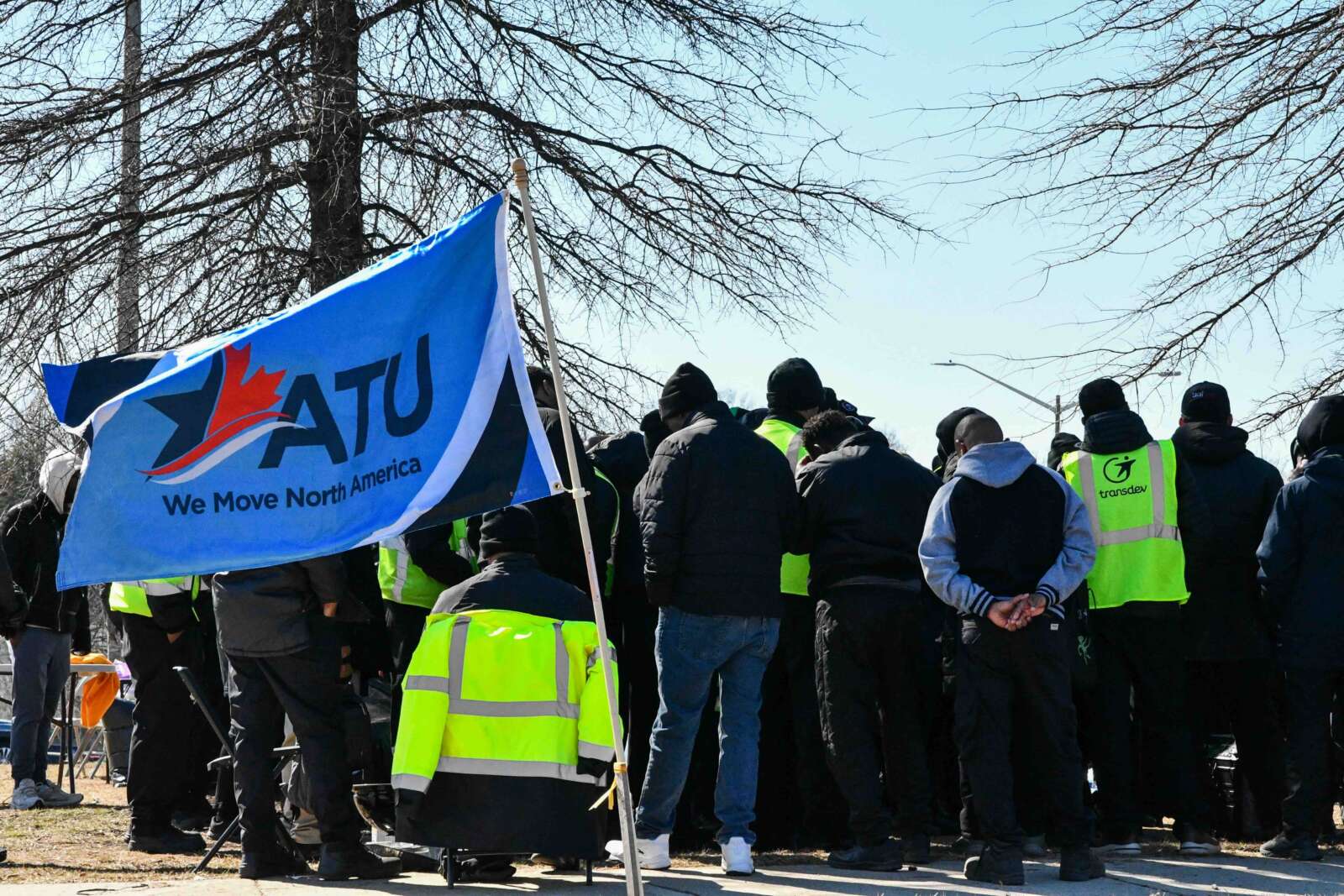
Updated at 9:45 p.m. on 3/6/2024 — Fairfax Connector workers with ATU Local 689 voted today (Wednesday) to ratify a new contract with bus operator Transdev, ending a 15-day strike, the union announced.
The bus system will officially resume service on Friday (March 8), according to Transdev and the Fairfax County Department of Transportation.
“Our management teams and staff have been preparing to restore full bus service as soon as possible after approval of the new contract,” FCDOT said. “We appreciate the patience and understanding of our passengers during this challenging time and look forward to welcoming them back on board.”
Earlier: An end to the strike that has kept Fairfax Connector buses on ice for nearly two weeks may be near.
ATU Local 689, the union representing more than 600 bus drivers and mechanics who run Fairfax County’s public bus service, have reached a “tentative” contract agreement with Transdev, the contractor that operates the service, the union announced tonight (Tuesday).
The news came just two hours after the Fairfax County Department of Transportation announced at 6 p.m. that service would be suspended tomorrow (Wednesday) for a 14th consecutive day.
According to an ATU spokesperson, the strike remains in effect, but union members won’t be picketing. Instead, they will vote on whether to ratify the new contract, which will set standards for pay, benefits and working conditions and replace one that expired on Nov. 30.
“If it passes, they could return to work as soon as Thursday,” ATU Local 689 spokesperson Ben Lynn said.
Fairfax Connector workers have been striking since Feb. 22, when the union called for a work stoppage, saying it remained far apart from Trandev in what they were seeking from a new contract, even after 12 bargaining sessions.
While details of the potential agreement aren’t currently available, Local 689 says it secured “major transformative improvements…that would guarantee retirement security for members, include competitive wages for bus operators and mechanics, and enhance the 40-hour guarantee,” among other priorities.
Transdev confirmed that it had reached “a mutually agreeable, tentative agreement.”
“The next step will be for the ATU 689 membership to vote on ratifying the contract tomorrow,” a Transdev spokesperson said. “We will immediately prioritize restoring full service as soon as possible.”
Fairfax Connector service has been suspended throughout the strike, disrupting travel for the approximately 26,000 passengers who ride its buses daily.
FCDOT encouraged riders to utilize alternatives such as teleworking, carpooling, walking, bicycling, Metro and Virginia Railway Express (VRE), though many commuters resorted to ride-sharing services. Starting last Friday (March 1 ), the county offered free Capital Bikeshare rides.
Fairfax County Board of Supervisors Chairman Jeff McKay said in a newsletter that participants in the Transit Ridership Incentive Program (TRIP), which provides half-price fares to low-income riders, got “a supplemental one-time credit in their accounts that they can use for alternative transportation during the strike.”
Though initially criticized by the union for not taking a more vocal stance on the contract dispute, McKay got involved last week when he sent a letter to a federal mediator on Feb. 28, asking her to move up talks between Transdev and ATU that previously weren’t scheduled to resume until March 5.
In a statement, McKay said county leaders are “pleased” by the news of a tentative agreement, signaling that Fairfax Connector service could resume soon.
“The mutually agreeable solution that resulted from this effort not only respects the exemplary work of the system’s drivers and mechanics but ensures that we are moving forward in a fiscally responsible and sustainable manner that benefits our residents,” McKay said.
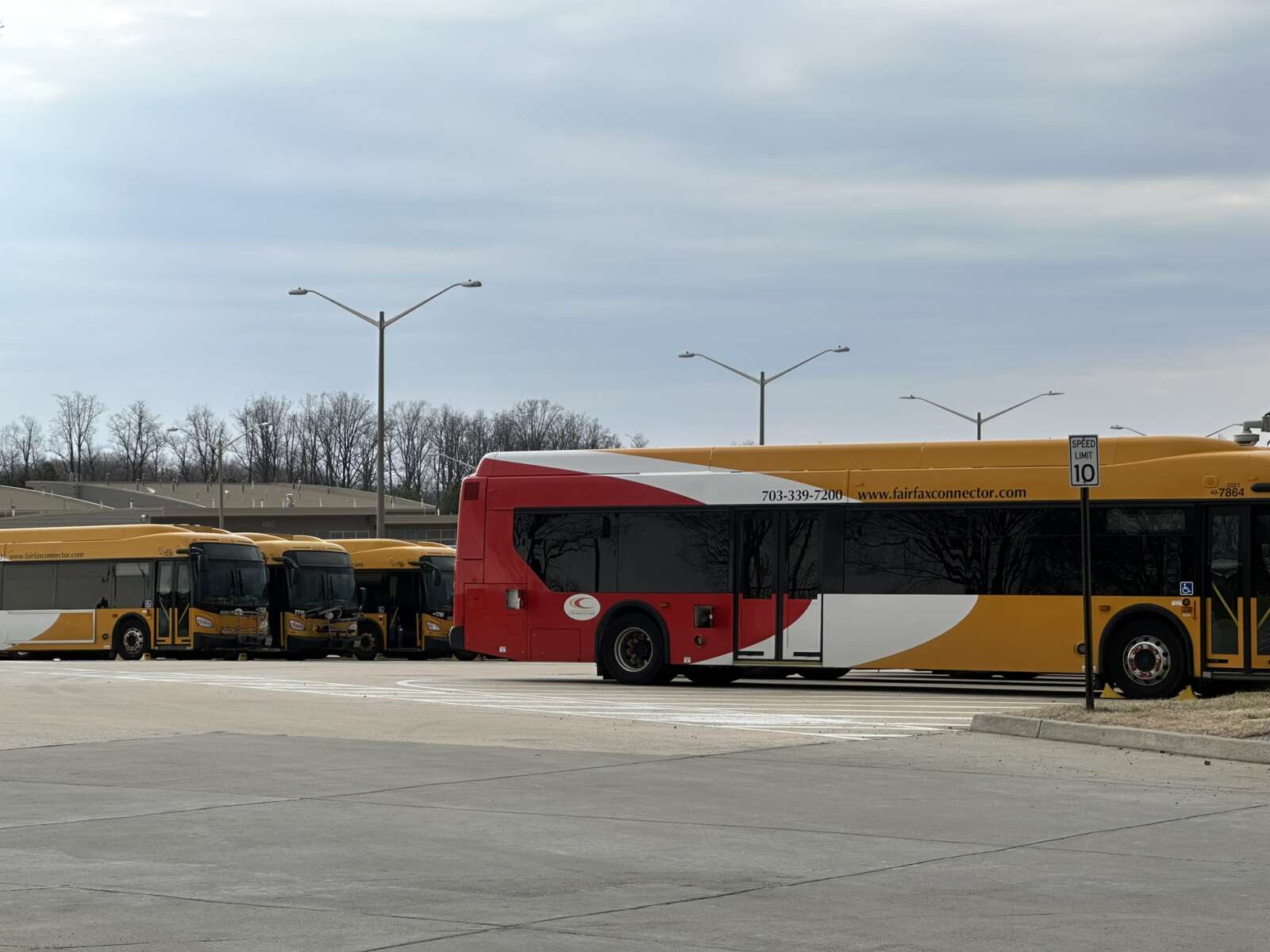
(Updated at 10:30 a.m.) Fairfax Connector is now in its sixth consecutive day without service, as workers continue their strike for better pay, benefits and working conditions.
More than 600 bus drivers and mechanics ceased working last Thursday (Feb. 22) when their union — Amalgamated Transit Union (ATU) Local 689 — called for a strike after months of negotiations with Transdev, the private company that operates Fairfax Connector, for a new labor contract to replace one that expired on Nov. 30.
In a press release, the union said yesterday (Monday) that it met with Transdev but didn’t reach an agreement, stating that the company “failed to offer an acceptable deal,” particularly when it comes to retirement contributions.
The Fairfax County Department of Transportation has said Northern Virginia’s largest public bus system can’t resume service until the strike ends, forcing the Connector’s approximately 26,000 daily riders to find alternate travel options. The county has suggested teleworking, carpooling, walking, bicycling or using other transit, such as Metro and Virginia Railway Express (VRE).
County data indicates that most commuters drive to work, as public transportation usage fell during the COVID-19 pandemic, from 10% in 2019 to 5% in 2022. However, Fairfax Connector’s ridership appears to have bounced back last year, exceeding 2019 levels with 774,875 passengers as of June, according to the Northern Virginia Regional Commission’s transit data dashboard.
In addition to workers, the Connector provides a crucial travel option for many students, who can get a free pass if they’re in middle or high school that can also be used for Fairfax City’s CUE bus and, for select schools, Metrobus.
According to ATU Local 689, the next bargaining session isn’t scheduled until March 5, when federal mediators are expected to attend. This strike has already surpassed the last Connector work stoppage, which lasted four days in 2019.
Updated at 3:55 p.m. — Fairfax Connector service will stay suspended at least through this weekend (Feb. 24-25) as drivers and mechanics continue their strike, the Fairfax County Department of Transportation has announced.
FCDOT says it “expects negotiations to continue in good faith with the goal of completing a new contract very soon.”
Earlier: Stagnant wages. Eleven-hour work days with barely enough break time for a meal. Just seven days of sick leave, even after a pandemic that research suggests sickened and killed transit workers nationwide at an elevated rate.
Those are some of the challenges Fairfax Connector workers report facing under Transdev, the private company that Fairfax County hired in 2019 to operate its public bus system. In a bid for improved working conditions, more than 600 bus drivers and mechanics are now on their second day of a strike called yesterday (Thursday) by Amalgamated Transit Union (ATU) Local 689.
“You have to make a choice. When is enough, enough? When do you stand up and fight back? It was time to stand up and fight back,” Sharon Forsyth said while picketing outside the West Ox Road Bus Facility where she works as a Fairfax Connector driver. “What the outcome would be, who knows? But at least my voice was heard…Treat us right. Fair contract, fair wages, sick leave. Give us something more than a slice of pizza and a handshake after 35 years of service.”
A relative newcomer who joined the Connector just over a year ago, Forsyth has worked in transportation for 37 years — including a previous stint with Transdev. The starting salary for drivers is nearly the same as it was 20 years ago, which is “unacceptable,” she says.
“You can’t afford the housing in this region. You can barely afford food in this region,” said Forsyth, who commutes from Prince William County. “So, that is the purpose of this. Nobody wants to be here, but we’re all here, you know? If you don’t take care of the people that run your business, you’ll soon be what? Out of business.”
Forsyth was one of about 128 people who showed up yesterday to march, chant and display signs at the West Ox facility (4970 Alliance Drive), which employs about 163 Connector workers, according to ATU Local 689 organizer Troy Barnes. Workers began convening around 2 a.m., rotating in three shifts.
Across all three Connector garages, including ones in Herndon (268 Spring Street) and Lorton (8101 Cinder Bed Road), about 97% of the workers represented by the union were expected to join a picket line, Barnes told FFXnow.
Authorized by members on Dec. 29, the strike call came after Local 689 and Transdev spent 12 bargaining sessions between October and last Friday, Feb. 16 trying to hammer out a new labor contract that will determine pay, benefits and working conditions, according to the union. Before the strike, workers were operating under a four-year contract that was negotiated after a four-day strike in December 2019 and expired on Nov. 30, 2023.
Fairfax Connector service will remain suspended until the strike is resolved, leaving around 26,000 daily bus riders in limbo, the Fairfax County Department of Transportation has said.
UPDATE: All Fairfax Connector bus service remains suspended Friday, February 23. We are continuing to monitor contract talks between Connector’s operations contractor, Transdev, and the Amalgamated Transit Union (ATU) Local 689, which represents Connector drivers and mechanics.
— Fairfax Connector (@ffxconnector) February 23, 2024
As reported yesterday, Transdev called the union’s work stoppage disappointing in a statement that detailed some of its contract proposals, including a 19.5% wage increase over three years, coverage for 90% of health care expenses and 50% of dental and vision expenses, and yearly performance bonuses of up to $5,300.
However, Barnes says the contractor’s offers for sick leave, retirement benefits and guaranteed work hours remain inadequate. Read More

(Updated at 11:35 a.m.) Fairfax Connector workers have launched a strike after months of negotiations for a new labor contract with Transdev, the company that operates Fairfax County’s bus service.
Amalgamated Transit Union (ATU) Local 689, which represents about 638 bus operators and mechanics for Fairfax Connector, announced the strike just after midnight today (Thursday). Workers began hitting picket lines at garages in Herndon, Lorton and on West Ox Road in the Fairfax area at 2 a.m.
Due to the walk-off, Fairfax Connector has suspended service on 93 of its routes, starting at 9 a.m. The bus system serves approximately 26,000 passengers daily, according to its website.
“We encourage our users to please use alternative methods of travel. We apologize for any inconvenience,” the transit agency said.
The bus system can’t resume operations until the drivers and mechanics return to work, a Fairfax County Department of Transportation spokesperson confirmed.
🚨Due to a job action and work stoppage taken by the Amalgamated Transit Union (ATU) Local 689, Fairfax Connector Service will be suspended today at 9:00 AM. Please use alternative methods of travel. We apologize for any inconvenience. Check here for updates.
— Fairfax Connector (@ffxconnector) February 22, 2024
Members gave the union the authority to call a strike on Dec. 29, nearly a month after their existing contract with Transdev expired on Nov. 30.
In a news release, the union said there remains “a vast divide” between its demands and Transdev’s, and a strike became “unavoidable” after 12 bargaining sessions due to “Transdev’s unfair labor practices and regressive bargaining.” It also criticizes Fairfax County Board of Supervisors Chairman Jeff McKay for an alleged “refusal to weigh in.”
“The Union remains committed to bargaining in good faith to reach a tentative agreement on a new contract and intends to continue to meet with Transdev even while on strike,” Local 689 said in a statement. “Several key priorities in a new contract for Local 689 include true retirement security, more sick days, competitive wages for bus operators and mechanics with regional transit companies, and balanced labor-management rights.”
Transdev said in a statement that it’s “disappointed” the union initiated a strike despite what it describes as a “generous offer” that included $126,000 in annual pay and benefits for a majority of drivers and $128,000 annually in pay and benefits for 78% of mechanics represented by ATU.
“This unexpected action has had a severe impact on the community, particularly those who depend on the Fairfax Connector for their daily transportation needs,” the contractor said. “Transdev put forth a comprehensive proposal that includes significant wage increases, healthcare benefits, retirement savings, bonuses, guaranteed minimum hours, and additional perks tailored to employees of all experience levels.”
In a statement to FFXnow, McKay said it would’ve been “inappropriate” for him to interfere with the contract negotiations, since Fairfax County isn’t a directly involved party.
I have been in communication with the County Executive and his team throughout this process and was aware of the impasse. I was not, however, aware that a strike would occur which has left the almost 26,000 daily users of the Connector without the service they rely on. I fully support the ability of Connector drivers and mechanics to be treated, and compensated, fairly. The service they provide to our residents is high quality. I also support the ATU Local 689’s right to advocate on behalf of their members. My hope is that the union and Transdev can reach agreement on a contract that is in line with similar transit services in our neighboring jurisdictions and that respects the exemplary work of drivers and mechanics. Additionally, while transit service is essential, the cost is ultimately borne by our residents and must also be considered in these negotiations. Connector service needs to be sustainable not just now but in the future.
Connector workers last negotiated a contract in 2019. Then represented by ATU Local 1764, they went on strike for four days that December before signing an agreement to resume work on Dec. 8. A new, four-year contract was ratified on Feb. 29, 2020, averting a potential second strike.
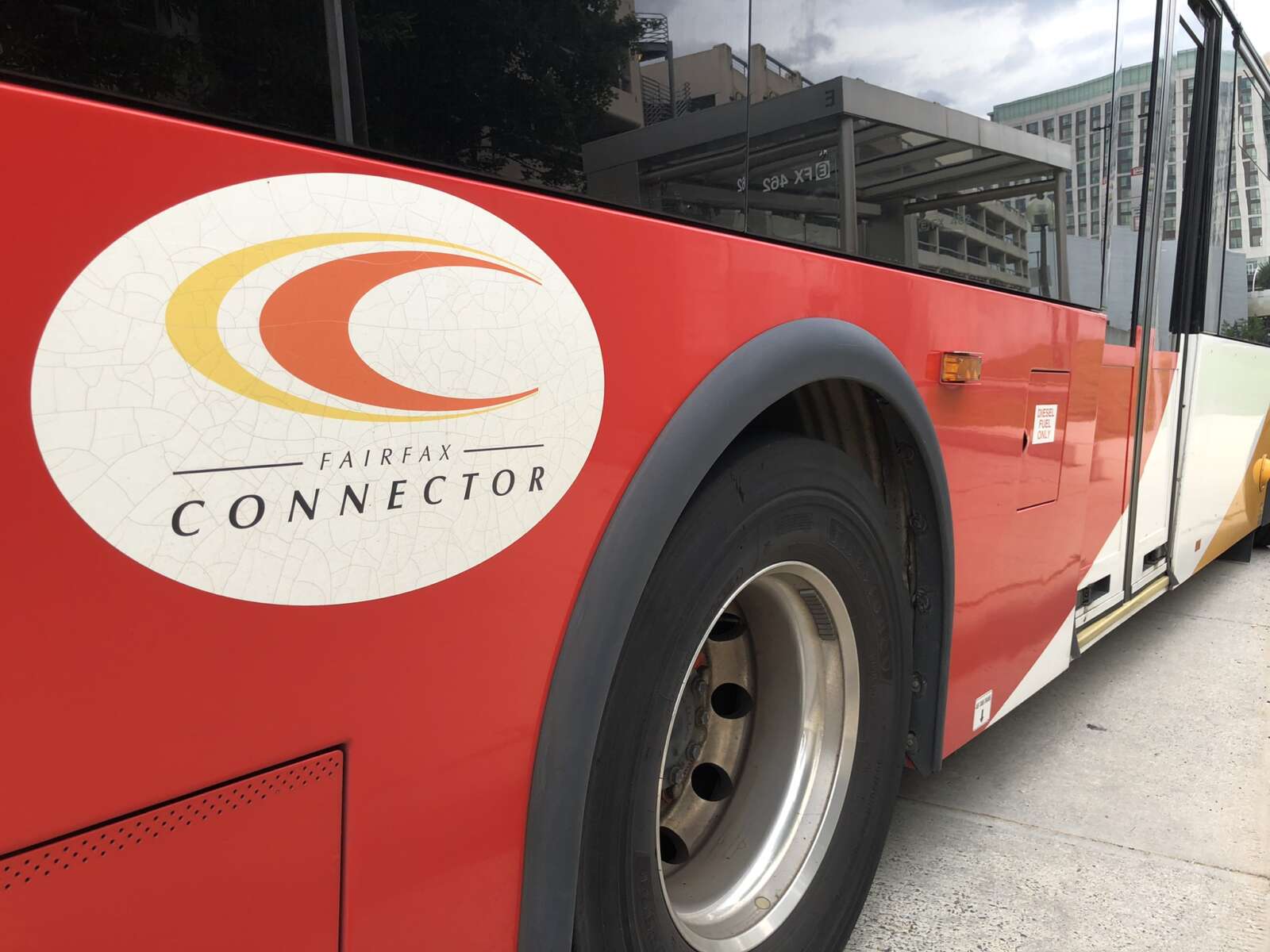
(Updated at 4 p.m.) Hundreds of Fairfax Connector workers could strike if contract talks between their union and employer break down.
Nearly a month after the end of their existing contract with Transdev, which operates Fairfax County’s public bus system, union drivers, mechanics and other employees voted on Dec. 29 to authorize a strike, the Amalgamated Transit Union (ATU) Local 689 announced yesterday.
As a policy, the union didn’t disclose how many of the approximately 546 Fairfax Connector workers it represents participated in the vote, but 99% of those who did voted in support of authorization, a Local 689 spokesperson told FFXnow.
Despite the recent authorization vote, a strike call doesn’t appear to be imminent, as the union says it has another bargaining session scheduled for Jan. 19.
“For the past three months, Transdev has proven time and time again that they are more interested in hoarding their money than making necessary investments to improve their dedicated and hardworking employees’ wellbeing,” Local 689 President Raymond Jackson said in a statement. “Our members are fed up with Transdev’s flat out refusal to fully engage in meaningful bargaining over key economic issues and attempts to distort facts.”
The workers who support Northern Virginia’s largest public bus system have been negotiating a new labor contract since October, when Local 689 delivered its first proposal to Transdev. The union has said its priorities include pay increases, better sick leave, standard work schedules and retirement security.
Shortly before the existing contract expired on Nov. 30, the union reported progress on some issues, but it said Transdev’s proposed wages still fell short of what workers are seeking.
Now, the union says Transdev “finally presented a decent wage increase proposal,” but the company is pushing the union to drop its demands for “improved dental care and sick leave, retirement security, and more stable working hours.”
(Correction: This article initially said that, according to the union, Transdev had threatened to withdraw its offer of improved sick leave and other benefits in exchange for the wage increases. A union spokesperson clarified that those benefits weren’t offered. Instead, the proposed pay plan was “contingent” on the union dropping its other demands.)
Transdev, which was first hired by the county to operate Fairfax Connector in 2019, says it’s continuing “to bargain in good faith” with ATU Local 689.
“To date, we’ve agreed to over 50 modifications to the prior [collective bargaining agreement] and proposed significant improvements to wages & benefits,” Transdev said in an emailed statement. “We value our partnership with the ATU and remain hopeful that we can come to a mutually-agreeable resolution quickly.”
However, Local 689 claims that many of the contractor’s concessions are either “technical corrections or the bare minimum necessary changes to keep somewhat competitive with other transit entities in the region.”
“A vast divide between the two sides still remains,” the union said.
Serving approximately 26,000 passengers a day on 93 routes, Fairfax Connector is currently operating under the expired contract, which was ratified in early 2020 after workers went on a four-day strike in December 2019 and raised the possibility of a second walkout.
The county’s plan for handling a strike, if the current contract dispute isn’t resolved, aren’t yet clear. The Fairfax County Department of Transportation told FFXnow it “has no comments about a potential strike at the moment.”
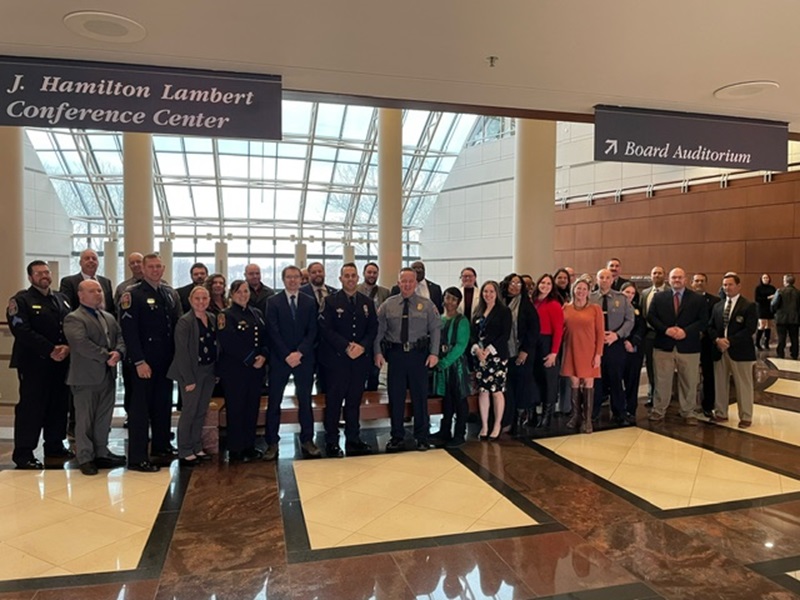
For the first time in over four decades, Fairfax County’s police officers and firefighters got an opportunity this year to negotiate their pay, benefits and working conditions with the local government.
The collective bargaining process led to new contracts for Fairfax County Police Department and the Fairfax County Fire and Rescue Department employees that union representatives and county leaders both lauded as meaningful wins for public safety workers.
The Fairfax County Board of Supervisors voted 9-1 on Dec. 5 to approve the agreements with the Fairfax chapter of the Southern States Police Benevolent Association (SSPBA) and the International Association of Fire Fighters (IAFF) Local 2068, committing the board to making a “good faith” effort to funding the pay increases and other contractual obligations in the county’s next budget.
Set to retire at the end of this year, Mason District Supervisor Penny Gross called the collective bargaining agreements “the heaviest lift” of her 28 years as chair of the board’s personnel committee. Though there was interest in letting employees negotiate their contracts when she was first elected, Virginia didn’t give localities that authority until 2021.
“It took seven terms to get us there and a change in the General Assembly,” Gross said. “But I am very pleased we are where we are…I think we are now in a place where we will be able to move forward with our employees, especially for our [public] safety and firefighters, and this is a nice note to go out.”
What’s in the contracts
Gross and Board of Supervisors Chairman Jeff McKay credited IAFF Local 2068 as an early advocate for collective bargaining. The board approved an ordinance in October 2021 that gave police, firefighters and general county employees the ability to negotiate their contracts through a union, an option that Fairfax County Public Schools workers also secured this past March.
Key provisions of the Local 2068 agreement include a new pay plan with a higher starting salary and annual raises for the first 25 years of service, pay for training, an additional period of light duty for workers after a pregnancy and a pay incentive for higher education, according to IAFF Local 2068 President Robert Young.
The contract also lets the union create a committee to review and make recommendations on insurance coverage, and both parties agreed to form a Joint Labor Management Committee to recommend future contract changes — potentially including reduced work hours for FCFRD workers who go into the field. A study to determine the cost and a timeline for a reduction must be completed by Jan. 1, 2026.
“We believe that this contract will be a solid foundation for future negotiations and give us the ability to collaborate to resolve future issues,” Young said in a statement. “…We were able to forecast some future needs like work hours and some of our vendors for benefits.”
Young said he’s confident that the contract’s financial components will be funded in the fiscal year 2025 budget, which will start on July 1, after the county and union negotiators “spent several months working to deliver a contract that was fiscally responsible and resolved some of the issues our members faced.”
Ratified by union members on Nov. 8, the contract will be in effect from July 1, 2024 through June 30, 2027. In addition to firefighters, medics, mechanics and other FCFRD personnel, it covers 911 call takers and dispatchers in the Department of Public Safety Communications.
On the police side, the SSPBA announced that its contract will increase officer pay by 12% over the next three fiscal years, provide “more equitable access” to leave and a more “streamlined” grievance process that includes the right of employees under investigation to be accompanied by a union steward. Read More

Fairfax Connector’s operator and workers remain far apart in their negotiations for a new labor contract, says the union representing drivers and other employees of Northern Virginia’s largest public bus system.
Amalgamated Transit Union (ATU) Local 689 accused contractor Transdev of “clearly not [being] serious about bargaining in good faith” in a strongly worded statement issued last Wednesday (Nov. 22), just before Thanksgiving.
Representing 546 employees of Fairfax Connector, which serves about 26,000 daily passengers across 93 different routes, the union confirmed that it got Transdev’s latest contract offer a day earlier. Exact details of the proposal weren’t shared, but the union says workers would still be paid “well below other transit workers” in the D.C. area.
“Transdev’s latest wage offer was a slap in the face since its insulting lowball offer is contingent on the Union withdrawing all of its other economic proposals which include better sick leave, reduced healthcare costs, and retirement security,” ATU Local 689 said in its statement.
The union also claimed that Transdev has “continuously dragged their feet” when responding to requests for meeting dates since the collective bargaining process began in October.
Transdev, a French company that took over Fairfax Connector’s operations and maintenance in 2019, disputed the union’s characterization of the ongoing contract talks, stating that it’s “committed to continuing negotiations in good faith.”
“We value our partnership with the ATU and remain hopeful that we can come to a mutually-agreeable resolution quickly,” a Transdev spokesperson said by email. “We have mutually agreed with ATU to schedule our next bargaining session on 12/1.”
The Dec. 1 bargaining session will come after the existing, five-year contract expires on Nov. 30 at 11:59 p.m.
According to Local 689 spokesperson Ben Lynn, both sides will continue to operate under the current contract even after it expires. Determining worker pay, benefits, working conditions and other issues, the contract was secured in early 2020 after a four-day strike upended bus service throughout the county.
The union could call for a strike authorization vote at any time, but Lynn says nothing has been scheduled so far.
Transdev says it doesn’t anticipate any service disruptions as a result of the agreement expiring.
In its statement, ATU Local 689 said it has “reached tentative agreements on a variety of issues,” but on several of its top concerns, which include wage increases, improved sick leave, retirement security and standardized schedules, the union has been met with “abysmally low numbers” or outright rejection.
“Local 689 members worked on the front line throughout the pandemic to move thousands of people every day across the region,” the union said. “Transdev’s employees deserve to have their dedication and hardwork respected by the company. They have refused to offer a realistic economic proposal that would account for the intense economic pressures impacting its employees over the past three years while continuing to profit off the backs of their workers.”
Fairfax Connector’s labor negotiations come at a challenging time for public transit in the D.C. area, as Metro faces a potential $750 million budget gap and declining fare revenue even as ridership starts to bounce back after the COVID-19 pandemic.
Without significant additional funding, the Washington Metropolitan Area Transit Authority said in October that it could be forced to drastically reduce rail and bus service starting July 2024, raise fares and lay off up to 4,700 workers.
ATU Local 689, which also represents Metro workers, warned WMATA against “balancing Metro’s budget on the backs of workers,” arguing that cutting service levels and worker compensation “simply will not solve the systemic funding issues plaguing” the transit agency.
According to Axios DC, Metro General Manager and CEO Randy Clarke will present an official budget proposal to the agency’s board of directors on Dec. 14.
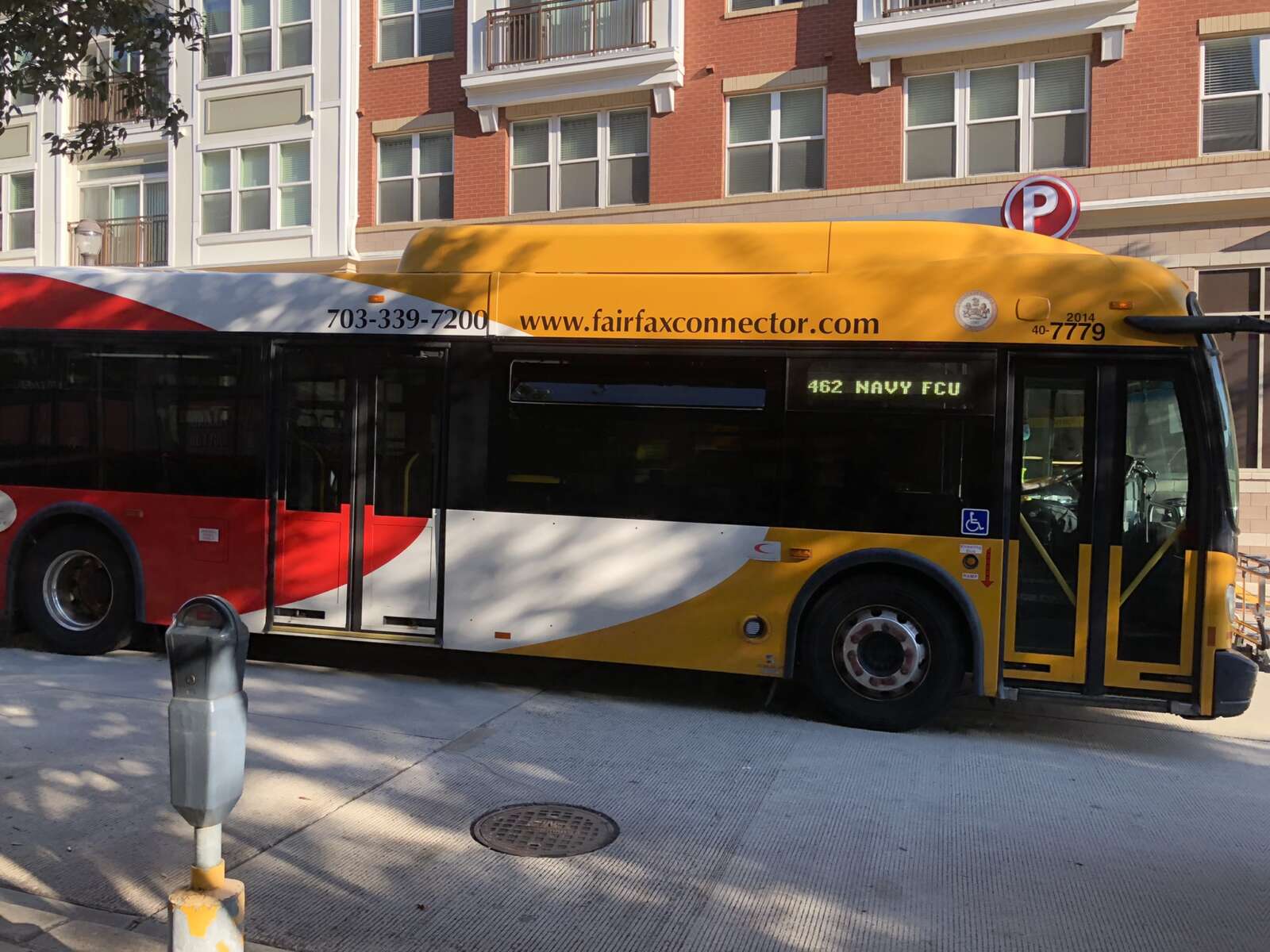
Negotiations over pay, benefits and working conditions are underway for hundreds of Fairfax Connector employees.
Amalgamated Transit Union Local 689 presented an initial proposal on Oct. 13 for a contract that would cover 546 members who work for Fairfax County’s bus system to Transdev, the company that operates the transit service, the union said in a press release yesterday (Monday).
With its current contract set to expire Nov. 30, the union says workers are seeking wage increases “to keep competitive with other transit companies,” improved sick leave, retirement security for current and future employees and standard 40-hour, 5-days-per-week schedules at all bus garages.
However, bargaining sessions scheduled for yesterday and today (Tuesday) were canceled over the weekend by Transdev, according to ATU Local 689, which said it was told the contractor “would not be ready to counter” its proposal.
“It is extremely disappointing that while Local 689 worked tirelessly to craft a new contract proposal and prepared to bargain in good faith, Transdev has apparently failed to do the same,” Local 689 President Raymond Jackson said in a statement. “Our members providing a public service in Fairfax County are dedicated professionals who deserve a fair contract. Local 689 remains committed to advocating for our members and is ready to meet with Transdev to negotiate the new contract. We hope Transdev prioritizes the contract talks and its employees, not profit.”
FFXnow reached out to a Transdev spokesperson for comment but didn’t hear back by press time.
The largest local bus system in Northern Virginia, Fairfax Connector transports about 26,000 passengers per day across 93 different routes, according to its website.
Though ridership plummeted in the first two years of the pandemic, it bounced back starting last summer, and this June, it surpassed 2019 levels with more than 774,000 riders for the month, according to data reported by the Virginia Department of Rail and Public Transportation.
When the Connector’s workers last had contract negotiations in 2019, bus drivers and mechanics — who were represented at the time by a different ATU chapter, Local 1764 — went on strike for four days before the union and Transdev signed a back-to-work agreement. Workers eventually ratified a new, four-year contract on Feb. 29, 2020, averting the possibility of a second strike.
According to a Local 689 spokesperson, Connector workers were assigned to their current chapter after Local 1764 went into receivership in 2021.
ATU Local 689, whose 15,000-plus members include employees of Metrobus and Alexandria’s DASH, welcomed former Local 1764 members on March 25, 2021, stating that “the companies kept us apart” even though members did the same work, often in the same garages.
This year’s negotiations are taking place in a different environment for organized labor, which has gained public support in the wake of the COVID-19 pandemic.
After authorizing a strike, local office cleaners won pay bumps earlier this month that their union called “historic,” and Kaiser Permanente workers secured 21% raises following a three-day strike on Oct. 4-6. The United Auto Workers expanded a strike against vehicle manufacturers in Detroit yesterday, while negotiations between Hollywood studios and the actors’ union, SAG-AFTRA, are slated to resume today — 103 days after they went on strike.
The Fairfax County Department of Transportation has a five-year, $443 million contract with Transdev, which took over the Connector’s operations and maintenance in July 2019 from the previous contractor, MV Transportation, according to previous reporting by the Washington Post.
“FCDOT Connector has no comments about this matter at this time,” FCDOT said when asked about the current talks.
Fairfax County Board of Supervisors Chairman Jeff McKay, who met with the union and Transdev to resolve the 2019 strike, says he has “not been privy” to the new contract discussions, since they’re still at a relatively early stage.
“My hope is that Transdev and the members of ATU Local 689 can come to a mutually agreeable contract that prevents a disruption of service,” McKay told FFXnow.
According to Local 689, there are three scheduled bargaining sessions remaining before the contract expires next month. The union claims that Transdev dragged its feet on providing available dates earlier this year.
“Local 689 is in the process of rescheduling the sessions with Transdev, and is more than willing to add additional sessions if needed,” the union said.

